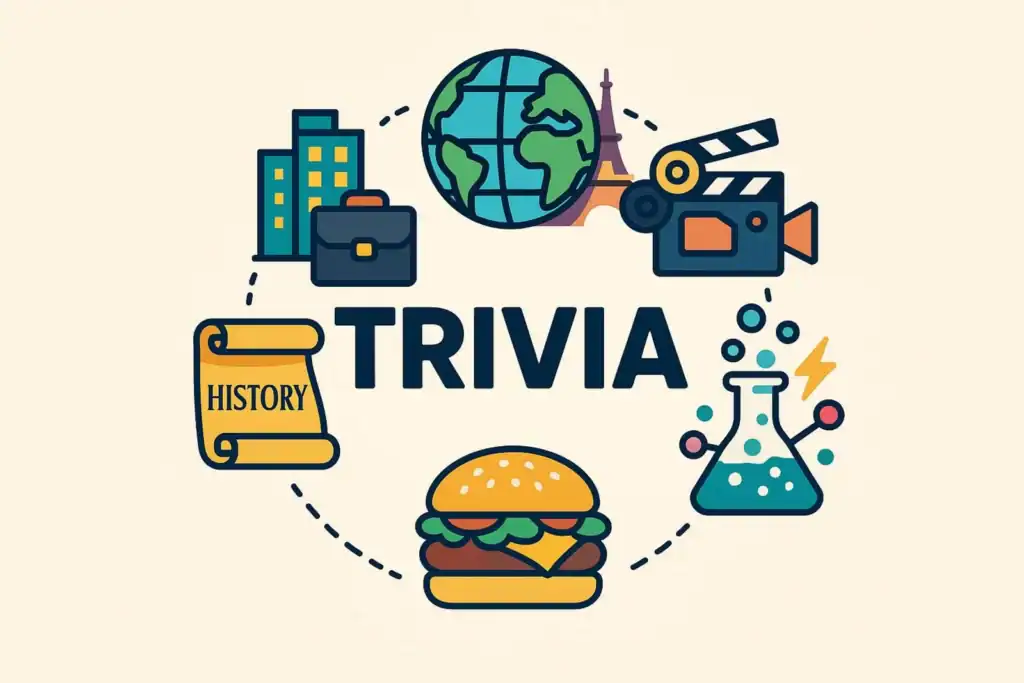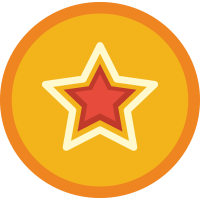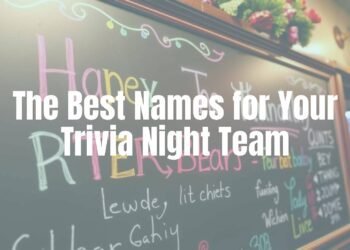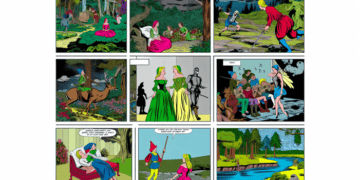Team building trivia questions are a fun and effective way to build teamwork, lift morale, and strengthen relationships across in-person, virtual, and hybrid teams. These prompts are more than quick distractions; they are smart tools that get people talking, thinking, and laughing together. By turning regular meetings into interactive moments, trivia gives you an easy-to-run but high-impact way to improve communication, spot strengths, and create a friendlier workplace. It breaks up routine, adding a welcome dose of humor and friendly competition to the day.
Trivia works well because it’s flexible. You can customize it for any group, from a short icebreaker at the start of a meeting to a full game during a virtual happy hour. The right mix of questions can spark great conversations, promote teamwork as people share what they know, and even reveal hidden interests. With remote and hybrid work on the rise, trivia helps bridge the distance, creating shared experiences and a common culture. It reminds everyone that work can be enjoyable, which leads to a more engaged, productive, and connected team.
What Are Team Building Trivia Questions?
Team building trivia questions are prompts used in friendly quiz games that entertain, teach, and bring people together. Think of them as conversation starters with a fun competitive twist, made to appeal to a wide range of interests. These are not school pop quizzes; they are picked to encourage interaction, critical thinking, and group problem-solving. The aim isn’t to reward obscure facts but to create a space where everyone feels comfortable joining in and engaging with teammates.
Topics can include quirky history, pop culture, science, or company stories. The key is to pick questions that many people can answer while still being challenging enough to prompt discussion and a sense of pride when someone gets it right. In a game format, trivia turns learning and interaction into a fun activity, making it a strong way to build team cohesion and a positive workplace culture.
How Do Trivia Games Promote Team Building?
Trivia encourages collaboration and cooperation. Faced with a question, people naturally turn to their teammates to discuss options, share knowledge, and debate answers. This builds communication and active listening, as teammates explain their thinking and consider others’ ideas to agree on a final choice. It’s a low-pressure way to practice teamwork skills and see how others approach problems in a fun, non-work setting.
Also, trivia creates “positive shared experiences.” When a team nails a tough question, everyone feels the win. Even funny wrong answers bring people together. This is especially helpful for remote or hybrid teams where casual chats are rare. Trivia offers a structured but playful chance to connect beyond job roles, find common interests, and build rapport, which supports a more cohesive and helpful team.

What Makes a Trivia Question Effective for Team Engagement?
A good team trivia question hits the sweet spot: interesting enough to grab attention, clear enough to avoid confusion, and varied enough to appeal to different knowledge areas. The best questions aren’t just about rare facts-they spark conversation and give different people a chance to shine. A history fan might love one question, while another person lights up for a music or movie question. The aim is to give everyone a fair shot to contribute.
Clarity and brevity matter. A well-worded question leaves no confusion, so teams can focus on the answer, not the wording. Adding a short “fun fact” with the answer makes it more memorable. Learning that mouse speed can be measured in “Mickeys,” or that the first item sold on eBay was a broken laser pointer, turns a simple quiz into a fun learning path, keeping people engaged and ready for the next fun fact.
What Are the Benefits of Using Trivia Questions for Team Building?
Using trivia for team building brings many benefits beyond a quick break. These interactive games support team cohesion and individual well-being. They spark lively talk, strengthen a sense of belonging, and help create a healthier, more productive workplace. Because the setting is low-stakes, people can show different sides of themselves that may not appear in everyday work.
In today’s varied work setups, where teams can be spread across locations and time zones, connecting can be hard. Trivia cuts through those barriers with a universal mix of fun and competition. It tackles key parts of team dynamics-communication, morale, and inclusivity-turning possible issues into chances for growth and enjoyment. These positive moments can raise job satisfaction, reduce turnover, and build a stronger culture.
Improves Communication and Collaboration
A lively round of trivia during work meetings can spark better communication and collaboration. When teammates face a tough question, they jump into open discussion, share logic, and weigh different ideas. This real-time debate sharpens speaking and listening skills in a fun way. People have to truly listen to build on others’ ideas or offer a counterpoint.
Also, teaming up on fun work trivia creates shared moments outside usual tasks. These bursts of group problem-solving build trust. Working together toward a common goal-even just winning a round-teaches people to rely on each other’s strengths. This spirit often carries back into projects, breaking down silos and opening the flow of ideas.
Boosts Morale and Engagement
Keeping people engaged can be tough, especially with remote and hybrid work. Disengagement can hurt productivity and business results, costing the global economy an estimated $8.8 trillion. Trivia can help. Adding funny trivia questions at work offers a short break and brings fun into the day, which can counter “quiet quitting.”
Light topics help people relax, laugh, and recharge. These moments of joy and friendly contests lift morale and make employees feel valued and connected. When people like their team and environment, they’re more engaged and productive. Regular activities like trivia are linked to big gains: 70% higher well-being, 18% better sales productivity, and 23% higher profitability, according to Gallup.
Encourages Friendly Competition
A bit of friendly competition can boost energy fast, and trivia is perfect for that. The rush of a correct answer and playful team banter create a lively atmosphere. The stakes are low, so the focus stays on teamwork and fun, not pressure. Teams plan together and combine their knowledge to do well while keeping things positive and supportive.
This competitive spark motivates people to join in more actively. It gives individuals a chance to show what they know and earn peer recognition, which builds confidence. Whether a team wins or loses, the shared experience builds bonds and lasting memories. Friendly competition through trivia often lifts team spirit and a sense of shared purpose that helps with everyday work.
Fosters Inclusivity Across Diverse Teams
One standout benefit of team trivia is how it supports inclusivity. Trivia levels the field, so everyone can jump in regardless of role, tenure, or background. From the CEO to a new hire, answering work trivia gives each person a chance to contribute. This kind of fairness helps build psychological safety-a key part of high-performing teams where people feel safe sharing ideas.
With a wide range of categories-general knowledge, pop culture, history, science-more people get chances to shine. This shows off the team’s varied strengths and helps everyone appreciate each other’s knowledge. It builds a sense of belonging and respect. This inclusive vibe improves collaboration, sparks creativity, and supports innovation, as different viewpoints are welcomed in a fun, engaging way.
Which Types of Team Building Trivia Questions Work Best?
Trivia offers endless options. To fully engage a mixed group, mix and match question types so there’s something for everyone. A balanced game touches different categories, letting different people show what they know and feel included. The aim is a fresh, exciting experience with chances for both individual wins and team success.
Changing up themes keeps the energy high and prevents any one group from dominating. This variety is fun and quietly reminds everyone that team strength comes from a range of skills. Let’s explore some effective categories for team trivia.

General Knowledge Trivia
General knowledge questions get everyone comfortable fast. They cover wide topics many people have seen before, so they’re easy to join and not intimidating. They make great icebreakers and help people build confidence before moving to niche categories. Questions like “What is the most abundant gas in Earth’s atmosphere?” (Nitrogen) or “How many countries are in the UN as of 2025?” (193) are solid starters.
Because these questions are universal, everyone has a fair chance to help. This builds shared participation and can spark fun side chats about how someone knew an answer. For example, knowing Mercury is closest to the sun but Venus is hottest because of its thick atmosphere adds depth to a simple space question. This category sets a welcoming tone for any team.
Pop Culture and Entertainment Trivia
Pop culture and entertainment trivia work well for remote teams because they create shared references across distance. These questions often lead to “aha!” moments and lively debates since most people consume some media. From movies and TV to music and celebrities, this category is light and relatable.
Try asking, “Which movie won the Academy Award for Best Picture in 2023?” (Everything Everywhere All at Once) or “What is the name of the cowboy doll who is the main character in Toy Story?” (Woody). These draw on common experiences and can lead to chats about favorite films, songs, or shows. Including current streaming hits, music artists, or games broadens appeal and keeps people engaged.
Geography and Travel Trivia
Geography and travel trivia take teams around the globe and often bring out fun personal stories. It’s great for exploring different cultures and places. Questions can include capital cities, landmarks, or unique facts. For example, “What is the smallest country by land area?” (Vatican City) or “Which country has the most natural lakes?” (Canada, with over 2 million!).
This category can also prompt people to share trips or dream destinations. It encourages curiosity about the wider world. Learning that the Nile is the longest river, or that Australia is both a country and a continent, adds an educational but entertaining twist. It often inspires teams and reminds them how big and varied the world is.
Workplace and Business Trivia
Workplace and business trivia links the fun of trivia to everyday work. It can be general business facts or specific to your company and industry. For general questions, try “What does ‘CEO’ stand for?” (Chief Executive Officer) or “Which company’s slogan is ‘Just Do It’?” (Nike). These test common acronyms, brands, and basics.
Company-specific questions can be very powerful. Ask, “What year was our company founded?” or “Who was the first employee?” These teach new hires about the company and let long-time staff share history and stories. You can include industry trends, key competitors, or light facts about office culture, like “Which day do most people call in sick?” (Monday). These support learning, reinforce values, and build a shared identity.
Science and Technology Trivia
Science and technology trivia is great for curious teams. It covers the natural world and rapid tech advances, offering smart, interesting topics. Questions can go from basics to cutting-edge developments. For example, “Which planet is called the ‘Red Planet’?” (Mars) or “What does ‘AI’ stand for?” (Artificial Intelligence).
This type of trivia supports analytical thinking and problem-solving, as people recall facts and breakthroughs. Learning that Apple created the iPhone, first released in 2007, or that there are 1,024 megabytes in a gigabyte (in binary computing), adds useful knowledge and prompts reflection on how tech shapes our lives. It’s especially fun for technical teams who like connecting over shared interests.
Food and Drink Trivia
Food and drink trivia appeals to almost everyone. It’s easy to relate to and often funny. Questions can cover food history, global dishes, famous drinks, or quirky facts. Try asking, “Which country is known for inventing pizza?” (Italy, especially Naples) or “What’s the most consumed drink in the world after water?” (Tea).
This category creates a relaxed, friendly vibe. It taps into shared food experiences, which are strong social connectors. Learning that durian is called the “king of fruits” despite its strong smell, or that black pepper once worked as currency, adds surprise and fun. It can spark talk about potlucks, favorite restaurants, or cooking tips.
History and Culture Trivia
History and culture trivia lets teams explore major events, key figures, and traditions worldwide. It encourages curiosity and respect for different heritages. Questions can span ancient times to recent milestones, from famous artists to customs. For example, “Who painted the Mona Lisa?” (Leonardo da Vinci) or “Which ancient wonder still exists today?” (The Great Pyramid of Giza).
This category prompts reflection on what shaped our world. Diverse teams may share personal connections to certain events or traditions. Learning that World War II ended on September 2, 1945, or that the first modern Olympics were in Athens in 1896, adds useful context and discussion. It teaches and unites by exploring our shared human story.
Sports and Recreation Trivia
Sports and recreation trivia is a quick crowd-pleaser. It taps into the draw of games, athletes, and outdoor fun. Questions can cover big events, famous players, game rules, or hobbies. For example, “Which country has won the most FIFA World Cups?” (Brazil, with 5) or “What’s the maximum score in ten-pin bowling?” (300, with 12 strikes).
It’s great for building camaraderie, especially among sports fans. It can spark talk about favorite teams, big moments, or personal sports stories. Knowing the Summer Olympics are every four years, or that baseball is called “America’s pastime” (even if many say football has passed it in popularity), adds color to the game. It’s a lively way to connect and enjoy some friendly competition.
Seasonal and Current Events Trivia
Seasonal and current events trivia keeps content fresh and relevant. It helps teams connect over recent happenings and shared moments. Questions can center on big holidays, recent news, cultural moments, or local events. For example, “Which holiday drives the most retail sales in the US?” (Christmas, about 20% of annual retail sales).
Because current events change, this category stays fresh every time. It encourages people to stay informed and share views. Seasonal themes also add a festive touch around holidays like Halloween or Thanksgiving. It shows the company culture is lively and tuned in to what’s happening.
Team Member and Company Trivia
Team member and company trivia may be the strongest category for building deeper connections. These questions focus on your organization’s story and people. Instead of generic facts, you ask about shared history and the folks who shape it. For example: “What year was our company founded?”, “Who was the first employee hired?”, or “What’s our most popular product or service?” These questions build a shared identity and pride.
You can also include questions about individuals (with permission), like “What’s John’s favorite coffee order?” or “Who on the team once ran a marathon?” These spark real conversations and help people know each other beyond job titles. This builds empathy, stronger bonds, and a more people-centered workplace.
How to Create and Select the Best Team Building Trivia Questions
Creating a great set of trivia questions takes thought about your audience, goals, and a bit of creativity. The aim isn’t to fill time but to build an experience that engages, teaches, and connects your team. It’s more than copy-pasting facts; it’s about picking questions that fit your group and spark interest and surprise. A careful approach helps everyone feel included and leaves a positive impression.
From balancing difficulty to keeping cultural sensitivity in mind, each part of the process shapes your event’s success. With attention to detail, you can turn a simple quiz into a strong tool for team growth and morale. Let’s explore the key steps for crafting standout trivia questions.
What Are Key Elements of Fun and Engaging Questions?
Strong trivia questions spark curiosity, invite discussion, and offer a satisfying “aha!” moment. Start with questions that are clear and concise, without confusing wording. Keep a mix of easy, medium, and hard. Easier ones boost confidence, while harder ones invite teamwork and a payoff when solved. You don’t want a round where everyone feels stuck, or one that’s too easy.
Adding a twist or a short “fun fact” with the answer really boosts engagement. Learning that the first item sold on eBay was a broken laser pointer, or that a Nile Crocodile’s bite is 30 times stronger than a human’s, sticks in people’s minds. Questions tied to common cultural touchpoints-movies, music, shared experiences-also work well. The best questions feel relevant, spark thought, and encourage interaction more than memorization.
How to Match Trivia Topics to Team Preferences
Matching topics to your team’s interests is key for getting the most engagement. One-size-fits-all rarely works. Before picking questions, think about your team’s mix, interests, and inside jokes. Do they chat about new movies or lean toward history docs? Are there shared hobbies you can use?
A simple approach is to poll the team ahead of time with a few category options and let them vote. This helps relevance and gives people a sense of ownership. Also, watch what comes up naturally in chats. If your team follows a sport, a sports round will land well. If they love food, a global cuisine round will likely be a hit. Make the trivia feel personal and custom, not generic, so it truly resonates.
Should Questions Vary in Difficulty for Different Groups?
Yes. Mixing difficulty boosts engagement and inclusivity, whether within a single team or across groups. A blend of easy, medium, and hard gives everyone-from interns to long-timers-a chance to contribute. Easy questions break the ice and calm nerves.
Medium questions keep things interesting and invite teamwork as people combine partial knowledge. Hard questions give a tougher mental workout and a proud moment when solved, showing off the team’s diverse expertise. For specialized groups, add a few industry-specific stumpers. Avoid making any round too hard or too easy, and keep the balance so interest stays high.
How Can Trivia Promote Inclusion and Avoid Controversy?
Building inclusion and avoiding controversy is very important for a positive experience. The goal is to bring people together, not divide them. Choose topics and wording with respect for different backgrounds and beliefs. Skip politics, religion, and other sensitive topics. Also avoid niche references only a small group would know, which can leave others out.
Focus on broad themes like general knowledge, widely known pop culture, science, geography, and company facts. Make questions culturally neutral and avoid stereotypes. If you include facts about countries, stick to well-known landmarks, food, or geography rather than sensitive history. You can also invite team members to suggest topics or write questions. This co-creation helps build an inclusive set and gives everyone a voice.
Sample Team Building Trivia Questions for the Workplace
Having a varied set of questions is key to a lively event. The samples below show what works across categories, blending fun, challenge, and workplace relevance. The best questions spark talk, encourage collaboration, and give everyone a chance to pitch in. Feel free to adapt these or use them as a starting point.
From light office moments to company milestones, these categories offer something for everyone. They help break the ice, deepen connections, and reinforce useful knowledge in a fun format. Let’s look at examples you can use for your next meeting or team event.
General Office Trivia
General office trivia is great for a quick, light round most people can relate to. It pulls from common workplace experiences and universal facts. It’s perfect for warming up the group and setting a playful tone before harder topics.
- What is the most common meeting length in corporate America? (Answer: 60 minutes, though productivity experts argue 25-30 minutes is more effective!)
- On which day of the week are workers most statistically likely to call in sick? (Answer: Monday, often attributed to “Monday blues.”)
- What does ‘CEO’ stand for? (Answer: Chief Executive Officer)
- What does ‘ROI’ stand for in business? (Answer: Return on Investment)
- Which company’s slogan is “Just Do It”? (Answer: Nike)
- What is the first name of the Twitter bird? (Answer: Larry)
- Blue Ribbon Sports is the original name of which company? (Answer: Nike)
- Who was the first African American female engineer to work at NASA? (Answer: Mary Jackson)
- What is the top-selling product at Walmart? (Answer: Bananas)
- What is the name of the largest technology company in South Korea? (Answer: Samsung)
Icebreaker Trivia Questions
Icebreaker trivia gets conversations started and helps people learn fun facts about each other or the wider world. These questions are light, surprising, and easy to join, making them great for opening a meeting or team session.
- What is the only food that never goes bad? (Answer: Honey)
- How many colors are in the rainbow? (Answer: 7 – red, orange, yellow, green, blue, indigo, violet)
- What is the name of the little dot seen above the ‘j’ and the ‘i’? (Answer: A Tittle)
- What is the driest place on Earth? (Answer: Dry Valleys, Antarctica)
- What country has a unicorn as its national animal? (Answer: Scotland)
- What is the name of the first human civilization? (Answer: Mesopotamia)
- What sea creatures have been used in wars? (Answer: Dolphins)
- What is the oldest city in the world? (Answer: Damascus, Syria)
- What is the national animal of Scotland? (Answer: Unicorn)
- What is the only food in the fruit family with seeds on the outside? (Answer: Strawberries)
Industry-Specific Trivia
Industry-specific questions engage teams in specialized fields and let people show their professional knowledge in a fun way. You can tune these to any sector and even use them to reinforce key facts or trends.
- What does ‘AI’ stand for in technology? (Answer: Artificial Intelligence)
- Which company developed the iPhone? (Answer: Apple, first released in 2007)
- What does ‘URL’ stand for? (Answer: Uniform Resource Locator)
- How many megabytes are in a gigabyte? (Answer: 1,024 in binary computing, though 1,000 is often used in marketing)
- As of 2025, which technology company is considered the most profitable in the world? (Answer: Apple)
- Who built the first Apple computer? (Answer: Steve Wozniak)
- Steve Jobs was a video game designer at what company in 1974? (Answer: Atari Corporation)
- Who was the first woman to own a seat in the New York Stock Exchange? (Answer: Muriel Siebert)
- What was the first company Elon Musk started and what was its purpose? (Answer: Zip2, which created internet city guides)
- What was the first product to have a barcode? (Answer: A pack of Wrigley’s Gum)
Company and Team-Oriented Questions
Company and team-focused questions are powerful for building internal pride and connection. They highlight your organization’s story, values, and people. They celebrate wins, teach new members, and showcase the personalities on the team.
- What year was our company founded? (Answer: [Insert Company Founding Year])
- Who was the first employee hired at [Company Name]? (Answer: [First Employee’s Name])
- What is the meaning or origin of our company logo? (Answer: [Explanation of Logo])
- What are the core values highlighted in our mission statement? (Answer: [List Core Values])
- What was our company’s first major project or product? (Answer: [First Project/Product])
- Which team member is known for always bringing in homemade treats? (Answer: [Team Member’s Name])
- What is the most popular item ordered for Friday team lunches? (Answer: [Most Popular Item])
- What city is our main office located in? (Answer: [City Name])
- How many countries do we currently operate in? (Answer: [Number of Countries])
- What was the name of our company’s first internal newsletter? (Answer: [Newsletter Name])
Tie-Breaker Challenge Questions
Tie-breakers are helpful when teams are neck and neck. These should be tougher or require precise answers to pick a clear winner. They raise the excitement and provide a clean finish to the game.
- How many total hours would you work if you work 40 hours per week from age 20-65? (Answer: Approximately 90,000 hours)
- How many floors does the Eiffel Tower have? (Answer: 3)
- How many miles is a full marathon? (Answer: 26.2 miles)
- How many zeros are in one googol? (Answer: 100)
- According to Albert Mehrabian’s research, what percentage of communication is non-verbal? (Answer: 55%)
- What is a commonly recommended length for holding attention in a presentation? (Answer: 18 minutes, like TED Talks)
- How many bones do giraffes have in their neck? (Answer: 7, the same as humans but much larger)
- How many standard time zones are there around the world? (Answer: 24)
- What is the name of the mechanically-powered shark from Jaws? (Answer: Bruce)
- In the book Harry Potter, what is the main ingredient of Polyjuice Potion? (Answer: Hair of the person you want to turn into)
How to Organize a Trivia Event for Your Team
Running a great trivia event is about more than collecting questions; it’s about building an experience. From planning to the final wrap-up, each step shapes a memorable activity. A clear structure helps the event run smoothly, boosts participation, and leaves a good feeling for everyone. You’re setting the stage for engagement, interaction, and a lot of fun.
Think through logistics, tech tools, and how you’ll wrap up. Each part plays a big role in turning a simple quiz into a lively team moment. Here are the key steps to host a trivia event your team will talk about.
Choosing the Right Format: In-Person, Virtual, or Hybrid
The first key step is picking the format: in-person, virtual, or hybrid. Each has its own pros and needs. In-person events allow direct interaction and a lively vibe, with spontaneous chats and high-fives. Snacks and drinks can add to the social feel. If your team is together, a room with whiteboards or flip charts for team answers adds to the fun.
For remote teams, a virtual format is needed. Platforms like Zoom or Microsoft Teams work well, and tools like MeetingPulse or Slides with Friends add quizzes and interactive elements. Virtual trivia is easy to join from anywhere. A hybrid setup needs planning to make both in-room and remote people feel equally involved. You might use a host for each group or tech that lets everyone interact smoothly. No matter the format, the goal is to make everyone feel included and involved.
Setting Up Teams and Scoring Systems
After choosing the format, set up teams and a simple scoring system. For the best engagement, aim for teams of 3-5 people. This size keeps everyone active and avoids anyone dominating or feeling left out. You can assign teams randomly to mix departments and spark new connections, or let people pick if you want to strengthen existing groups. Asking teams to pick creative names-bonus points for work puns-adds extra fun and identity.
Keep scoring straightforward. Decide if points are based on accuracy, speed, or both. You can award a flat number of points per correct answer or add bonus points for the fastest correct response. A live leaderboard-especially for virtual events-really boosts excitement and motivation. Tools like MeetingPulse can track scores and leaderboards for you. Share the rules and scoring at the start so there’s no confusion and people can focus on the game.
Using Technology to Boost Engagement
Digital tools can turn a standard trivia game into a highly engaging event. Platforms like MeetingPulse, Slides with Friends, or Kahoot! offer a set of tools to run interactive trivia in-person, virtual, or hybrid. They make it easy to display questions, run timers, and track scores in real time, which adds competitive energy.
Tech also lets you add creative extras. Use live polls for multiple-choice questions with instant results. Build word clouds from open-ended answers for a visual twist. Add picture rounds where teams guess a brand from a logo or a landmark from an image. Real-time leaderboards keep teams updated and fuel friendly competition. You can even have a teammate play a fun playlist during breaks or segment changes to keep the mood upbeat.
Recognizing Participation and Celebrating Winners
End with recognition and celebration. This step is important for reinforcing positive team dynamics and leaving people feeling appreciated. Announce the winning team with enthusiasm and give a small prize-bragging rights, a virtual badge, a gift card, or a rotating trophy. Keep the focus on shared fun, not the prize itself.
Also thank everyone for joining, their energy, and their ideas, no matter their score. Call out clever answers, funny moments, or standout teamwork. Ask for feedback for next time to show you value their input. By celebrating both the winners and everyone’s effort, you support a positive culture and build excitement for the next round.
Frequently Asked Questions about Team Building Trivia
Team building trivia is a popular way to boost workplace connection and engagement. With any new activity, you’ll have questions about setup, timing, and impact. These FAQs offer practical tips for adding trivia to your toolkit. From picking good questions to using it with remote teams, these answers help you run smooth and fun sessions.
Whether you’re in HR or leading a team, these insights help you get the most from trivia. Let’s look at common questions about team building trivia.
What Are Good Trivia Questions to Use at Work?
Good work trivia questions are engaging, inclusive, and fit a wide range of people without being too obscure or sensitive. The best ones balance fun, relevance, and a bit of challenge. Strong categories include general knowledge, pop culture (movies, music, TV), geography, history, and science. This variety gives different people a chance to shine.
To make it more personal, add company-specific questions like “What year were we founded?” or “Who was our first CEO?” You can also include light industry facts or common office habits. Pick questions that start conversations and teamwork, not silence or discomfort. Avoid political, religious, or very personal topics to keep the mood positive and unifying.
How Often Should You Use Trivia Games in Meetings?
How often you use trivia depends on your team, meeting schedule, and goals. It’s a great tool, but overuse can reduce its impact. For regular meetings, start with one or two quick questions as an icebreaker or end with a tie-breaker. This adds energy without eating up time.
For longer meetings or team-building sessions, a dedicated 30-60 minute trivia game can work well. Try it quarterly or twice a year as a standalone event or part of a virtual happy hour. Trivia is also a nice break in long agendas or after heavy topics. Use it strategically to lift morale and connection, and ask for feedback to find the best frequency for your team.
Can Trivia Questions Improve Remote Team Connections?
Yes. Trivia is a strong way to help remote teams connect. When people work apart, casual chats are rare, which makes it harder to build rapport and culture. Trivia gives a structured, fun space for people to connect. It creates shared moments that cross distance, letting teammates talk, collaborate, and laugh together in real time.
Through trivia, remote teammates learn each other’s personalities, strengths, and interests beyond daily tasks. Debating answers and celebrating wins builds camaraderie and belonging. Pop culture questions create common references, while company-focused questions reinforce shared identity. Tools like MeetingPulse or Slides with Friends make virtual trivia easy to host. These shared wins improve communication, reduce isolation, and support morale and productivity.








































